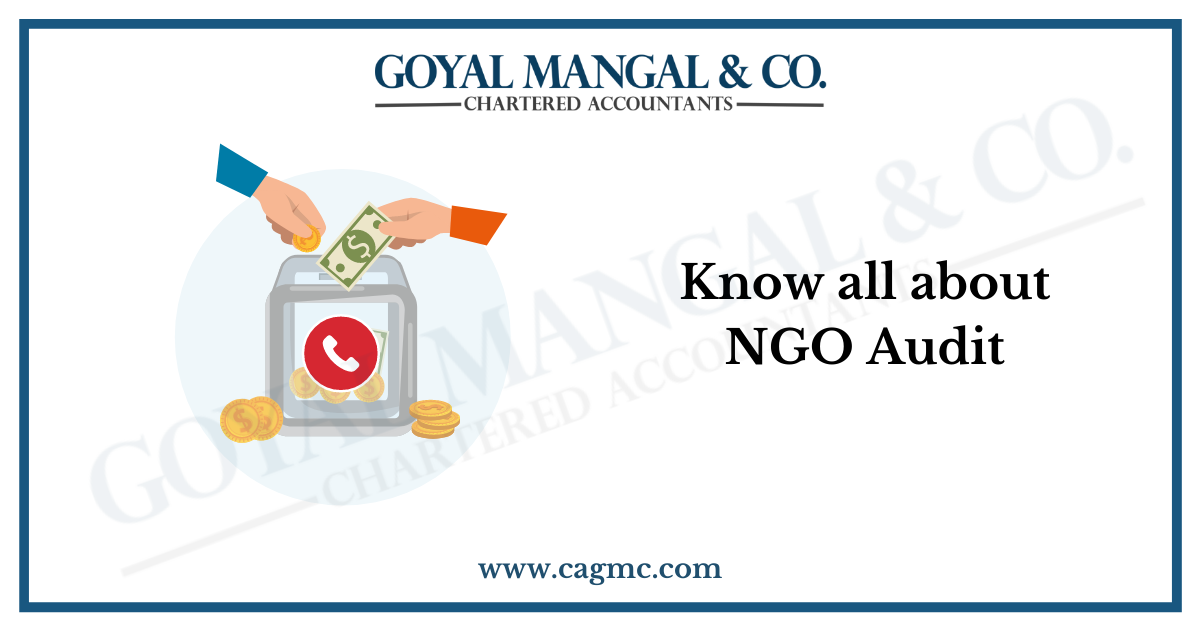NGOs are defined as the non-profit making organisations which raises funds from its members or donors or contributors apart from receiving donation of energy, time and skills for achieving social objectives like imparting education, economic assistance to poor, providing medical facilities, managing disasters and emergent situations.
The above definition would include religious organisations, voluntary health and welfare agencies, charitable organisations, research foundations, hospitals, old age homes etc. NGO renders an extremely wide scope of services.
NGOs are registered and governed by the Companies Act, 2013 are required to maintain their books of account under the accrual basis as per the provisions of Section 128 of the said Act. If the accounts are not maintained as per the requirement then it would be considered as non-compliance of the provision of the Companies Act, 2013. The NGOs which are not registered under the Companies Act, 2013 are allowed to maintain accounts either on a cash basis or accrual basis.

Source and Application of Funds: The most important sources of fund include donations and grants, advertisements, fund raising programmes, fees from the members, technical assistance fees / fee for services rendered, subscriptions, sale of produce, gifts or publications, etc.
A contribution made regarding the capital or the corpus of an NGO is called as corpus contribution. The donors have to specify whether the donation/grant provided by them shall be part of the corpus of the NGO. Such grants are generally provided with reference to the total funds required by an NGO.
As per Section 11(1)(d) of the Income Tax Act 1961 which also states that income in the form of voluntary contributions made with a specific direction that they shall form part of the corpus of the trust or institution shall not be included in the computation of total income. The purpose of a grant or contribution towards a Revolving Fund is to rotate the funds by giving a temporary loan from the amount to other NGO’s or beneficiaries for their projects and then to recover the same to further give as temporary loan and so on. However, the interest earned from those temporary loans from the revolving fund can either added back to the funds or are credited to the Income and Expenditure Account onnthe basis restrictions laid down by the authorities providing such contribution (for the revolving fund) or in accordance with the rules and regulations laid down by the concerned NGO in this regard.
NGO’s which accept donations and grants for the acquisition of some specific fixed assets have the primary condition before accepting the they should either purchase, construct or otherwise acquire the assets for which the grant is given.
NGOs receive contributions in kind also. These contributions includes assets such as land, buildings, , office equipment, vehicles etc. and articles related to programmes / projects such as food, , building materials, books, clothes, , and raw material for training purposes, e.g., Wool, reeds, cloth, beds etc.
Areas of application of funds for an NGO may include Establishment Costs, Maintenance Expenses, Office and Administrative Expenses, Programme / Project Expenses, Donations, Charity, and Contributions given, etc.
The audit programme of NGO should include in a sequential order of all assets, liabilities, income and expenditure ensuring that no material item is omitted.
(i) Corpus Fund: The contributions / grants received towards corpus be vouched with special reference to the letters from the donor(s). The interest income be checked with Investment Register and Physical Investments in hand.
(ii) Reserves: Vouch transfers from projects / programmers with donors letters and board resolutions of NGO. Also check transfer of gross value of asset sold from capital reserve to general reserve and adjustments during the year.
(iii) Ear-marked Funds: Check requirements of donors institutions, board resolution of NGO, rules and regulations of the schemes of the ear-marked funds.
(iv) Project / Agency Balances: Vouch disbursements and expenditure as per agreements with donors for each of the balances.
(v) Loans: Vouch loans with loan agreements, counterfoil of receipt issued.
(vi) Fixed Assets: Vouch all acquisitions / sale or disposal of assets including depreciation and the authorisations for the same. Also check donor’s letters/ agreements for the grant. In the case of immovable property check title, etc.
(vii) Investments: Check Investment Register and the investments physically ensuring that investments are in the name of the NGO. Verify further investments and dis- investments for approval by the appropriate authority and reference in the bank accounts for the principal amount and interest.
(viii) Cash in Hand: Physically verify the cash in hand and imprest balances, at the close of the year and whether it tallies with the books of account.
(ix) Bank Balance: Check the bank reconciliation statements and ascertain details for old outstanding and unadjusted amounts.
(x) Inventory: Verify inventory in hand and obtain certificate from the management for the quantities and valuation of the same.
(xi) Programme and Project Expenses: Verify agreement with donor/contributor(s) supporting the particular programme or project to ascertain the conditions with respect to undertaking the programme/project and accordingly, in the case of programmes/projects involving contracts, ensure that income tax is deducted, deposited and returns filed and verify the terms of the contract.
(xii) Establishment Expenses: Verify that provident fund, life insurance premium, employees state insurance and their administrative charges are deducted, contributed and deposited within the prescribed time. Also check other office and administrative expenses such as postage, stationery, travelling, etc.
And the receipt of income of NGO may be checked in terms of the following lines:
- Contributions and Grants for projects and programmes: Check agreements with donors and grants letters to ensure that funds received have been accounted for. Check that all foreign contribution receipts are deposited in the foreign contribution bank account as notified under the Foreign Contribution (Regulation) Act, 1976.
- Receipts from fund raising programmes: Verify in detail the internal control system and ascertain who are the persons responsible for collection of funds and mode of receipt. Ensure that collections are counted and deposited in the bank daily.
- Membership Fees: Check fees received with Membership Register. Ensure proper classification is made between entrance and annual fees and life membership fees. Reconcile fees received with fees to be received during the year.
- Subscriptions: Check with subscription register and receipts issued. Reconcile subscription received with printing and dispatch of corresponding magazine / circulars / periodicals. Check the receipts with subscription rate schedule.
- Interest and Dividends: Check the interest and dividends received and receivable with investments held during the year.


